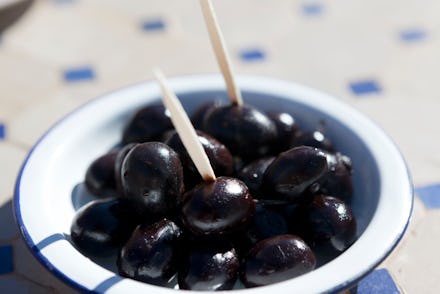If you despise olives, there could be a good reason why

To everyone who's grossed out by olives, this could be vindication: There is indeed something gross about olives, and it's not just how they taste. It's how they're processed.
Despite the olive's low culinary profile, there are armies' worth of people who absolutely despise them. One olive-hater described them as "balls of hell," expressing disdain for the slimy yet meaty texture as much as the taste. Much like people who hate Brussels sprouts or cilantro, olive objectors tend to be hyperbolic in their dislike.
So what makes olives so unappealing? Blame it on the processing. When they're freshly picked from the tree, unripe olives are inedible. The taste is so astringent that even the most bitter lover would have trouble getting them down. This pungent flavor is caused by a chemical called oleuropein, which is both unpalatable and a powerful antioxidant that could have cancer-fighting effects. Go figure.
Table olives have to be processed to remove some of that bitterness. Traditional methods use salt and spices, but the most popular way uses the power of sodium hydroxide, also known as lye.
A nice, cold chemical bath. Lye, as anyone who watched Fight Club will remember, is a powerful chemical used in everything from industrial cleaning to drain openers. As a caustic chemical, lye is described by the Agency for Toxic Substances and Disease Registry as "strongly irritating and corrosive." At certain levels, it can be extremely dangerous, potentially causing severe burns or respiratory damage. Luckily, lower levels have been deemed safe enough by the Food and Drug Administration to go in our food, as long as it's done right.
When it comes to olives, lye is what makes them palatable. In comparison to a salt processing method, which can take months, lye processing reduces curing time to seven days. If you've recently eaten a can of black olives — the kind with a rubbery texture and almost no taste — it was almost certainly processed using lye. "99% of black, canned olives are debittered with lye, " California Olive Growers Council representative Adin Hester told Mic.
Fortunately, Hester added, "You are certainly not eating lye." After the initial contact, Hester says, "they go through three to four [water] wash cycles to ensure that all of the lye is gone." The lye used for olives isn't going to hurt you, just as it doesn't harm us when used on soft pretzels. Plus, not all olives are processed with lye — Whole Foods has you covered with "traditionally cured" versions.
But chemical baths have an unfortunate side effect on olives. They take away the briny, pickled flavor we associate with olives, leaving the rubbery skin and meaty insides behind. "If you want to get what an olive truly tastes like," Hester says, "have a Sicilian-style olive — it retains some of that distinct olive bitterness."
The lye also modifies the texture, making it softer. It's why other processing methods are often preferred; immigrants from the Mediterranean regions, and food critics, are often unsatisfied with the canned olives they can buy at their local grocery store. There's a community of people getting unripe, green olives from the tree and pickling them at home. "They like to process the olives the way their ancestors did," Hester said.
But these days, the olives you're probably finding on your pizza have gotten a nice chemical bath that gives them that quality so many people loathe. For those who can't stand them, know you've been validated: The fruit is literally inedible in its natural state — and you're not crazy for thinking that even in their edible state, they're anything but.